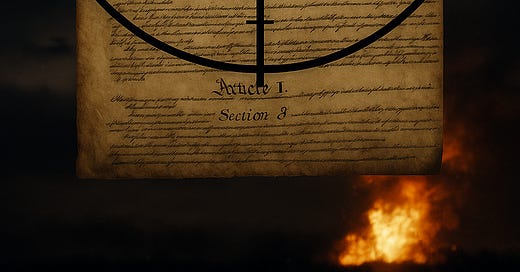The Strike Heard 'Round the World and the Constitution Ignored at Home
Trump’s bombing of Iran wasn’t just an attack abroad. It was a direct assault on Congress, the Constitution, and the rule of law.
In the dark of night, while much of the world slept, American bombers roared across the skies over Iran. B‑2 stealth aircraft, flanked by support drones and surveillance planes, dropped bunker-busting payloads on three of Iran’s most fortified nuclear sites, including Fordow, Natanz, and Isfahan. Explosions lit the desert, radar arrays vanished in fire, and President Donald Trump announced from a gleaming podium that “the Iranian nuclear threat has been eliminated.”
What didn’t happen was equally seismic: there was no debate in Congress, no vote, no declaration of war.
There was no letter of consultation to the Speaker of the House or the Senate Majority Leader, no closed-door briefing with the Intelligence Committee. There was no emergency. No confirmed imminent threat. No authorization. Just a command. Just a strike. Just a president who decided the world needed bombing and did it.
Want to Know Your Rights?
Download a free digital copy of the U.S. Constitution—the same document Trump is trying to bulldoze. Learn exactly what he's breaking… and how to fight back.
📬 Stay Informed. Stay Loud.
Subscribe to The Coffman Chronicle for no-BS political analysis, action guides, and weekly truth bombs you won’t get from corporate media.
The Pentagon dubbed it “Operation Midnight Hammer.” The name fits, but not in the way they intended it to. This wasn’t just a hammer swung at Iran’s nuclear program. It was a hammer brought down on the core of American constitutional order.
Because this moment, however it is spun, justified, or ignored, was not merely an escalation in foreign policy. It was an act of war ordered by a single man. And in the United States, under the Constitution, that power does not belong to him.
It was an unprovoked, unauthorized military strike against a sovereign nation’s homeland, carried out without a congressional vote. In modern U.S. history, that is unprecedented.
Past presidents have pushed the boundaries of war powers—from Truman in Korea to Obama in Libya—but none have ordered a full-scale bombing of another country’s nuclear infrastructure without consulting Congress or even alleging imminent danger. Not like this. Not at this scale. Not this nakedly unilateral.
This is what just happened: the president launched a war and locked Congress out.
The Constitution Has a Chain of Command
“The power to declare war, including the judging of the causes of war, is fully and exclusively vested in the legislature.” — James Madison, 1795
Long before America had drones, stealth bombers, or bunker-busters, it had a Constitution. And in that document, the power to declare war was not left vague. It wasn’t placed in a classified memo or outsourced to the Oval Office. It was written, clearly and deliberately, in Article I, Section 8:
“The Congress shall have Power… To declare War.”
Not the president. Not the Pentagon. Not the press secretary. Congress. The branch closest to the people. The branch that answers to voters every two years. The branch designed to be cautious, deliberative, and—most importantly—collective.
The Founders didn’t trust one person to make decisions of war and peace. They had just fought a war to break free from a king. The idea of vesting unilateral war powers in a president would’ve sounded to them like a return to monarchy. So they split the military authority: the president would be Commander-in-Chief of the armed forces, yes, but only after Congress made the decision to go to war.
That distinction isn’t ceremonial; it’s existential. It’s the firewall between republic and empire.
When Trump ordered the bombing of Iran’s nuclear facilities without a single vote or hearing, he didn’t just overstep his role. He bypassed the entire constitutional process. There was no shared judgment, no legislative check, no consultation of the people’s representatives.
That’s not “strong leadership.” It’s constitutional sabotage.
Some will argue the president must act swiftly in emergencies. And that’s true—when there’s an imminent attack. But this wasn’t that. There was no missile launch, no direct threat to U.S. soil or personnel. This wasn’t self-defense. It was self-authorized war.
And that’s not a power the Constitution gives him. That’s power it explicitly denies.
The War Powers Resolution Was Built for This
If there’s one law every American should be talking about right now, it’s the War Powers Resolution of 1973. It was passed in the wake of Vietnam, after years of undeclared war, executive secrecy, and mounting body bags. Congress, having watched the presidency balloon into something closer to a battlefield monarch, tried to put the guardrails back on.
The result was a statute that didn’t just suggest consultation with Congress; it required it.
“The President in every possible instance shall consult with Congress before introducing United States Armed Forces into hostilities…”
It also demanded that any such action be reported within 48 hours, and that the president withdraw troops within 60 days unless Congress affirmatively authorizes the conflict.
It’s not toothless. It’s the law.
And Trump ignored it entirely.
There was no report. No notification. No consultation. The first most heard of the bombing campaign was after the missiles had already left their silos and the bombs had cratered Iranian soil.
This wasn’t some tactical drone strike or a hot pursuit across a border. This was a coordinated, multi-theater, high-risk aerial assault on sovereign targets inside a foreign state. And it was ordered without so much as a nod toward the law that governs exactly this kind of decision.
The War Powers Resolution was designed for precisely this moment—a president reaching for war without cause or consultation. And yet, like so many laws built to constrain executive overreach, it was treated like a relic. Irrelevant. Optional.
But the law doesn’t say “optional.” It says shall.
This wasn’t just a policy failure. It was a deliberate end run around the law. A constitutional leash meant to bind presidential war-making was unclipped, and Trump didn’t just walk off with it. He ran.
And unless Congress yanks it back, the leash might as well be gone for good.
There Was No Imminent Threat
In the hours following the strikes, administration officials scrambled to justify the decision. They used familiar phrases: “national security,” “intelligence concerns,” “proliferation risk.” But none of those phrases amount to a legal green light for war. One phrase was conspicuously absent from their statements: “imminent threat.”
Because there wasn’t one.
No missile launches. No intercepted orders. No credible reports of an Iranian attack on U.S. forces, embassies, or allies. No act of aggression in motion that demanded an immediate military response. The truth? There was no emergency. No countdown clock. No visible trigger.
And that matters—not just ethically, but legally.
Under both U.S. law and international norms, the only legitimate justification for launching military force without congressional authorization is to repel or prevent an imminent attack. Not a hypothetical one. Not a general fear. A clear, credible, and immediate threat.
Even controversial actions like the Soleimani strike had a paper-thin claim of urgency. This had nothing—no timeline, no assessment, no classified briefing to Congress, not even an attempt to manufacture a casus belli. Just a flash of force and a shrug of explanation.
That’s not self-defense. That’s preemptive war, and the Constitution does not authorize it, nor by the War Powers Resolution, nor by the U.N. Charter, which allows for self-defense only in response to an armed attack, not speculation about what might happen someday.
The President may believe he prevented something, but a belief, no matter how firmly held, is not a justification for launching war. It's not a strategy; it’s an instinct. And when unchecked, that instinct becomes a doctrine of perpetual force.
If this is now the standard—“maybe someday, something could happen”—then we’re not just ignoring the Constitution. We’re living in a permanent state of executive paranoia.
This Is Part of a Pattern
This wasn’t a fluke. It wasn’t a moment of poor judgment or a rushed decision under pressure. It was part of a broader pattern, a deliberate strategy of consolidating power, one breach at a time.
President Trump has built his return to power on executive supremacy: purging the civil service, hollowing out oversight, ignoring subpoenas, and issuing sweeping orders that test the limits of legality. The strike on Iran isn’t an outlier. It’s a logical extension.
Each time a boundary is broken and left unchallenged, it becomes harder to restore. That’s how constitutional norms die—not in explosions, but in silence. And this moment can’t be another one lost to quiet.
See our recent reporting:
Voices of Dissent: Who’s Sounding the Alarm?
When Trump hit Iran’s nuclear facilities, it wasn't met with presidential backing; it sparked a political revolt.
Prominent Critics:
Sen. Chris Murphy (D‑CT) criticized the strike on X (formerly Twitter), calling out the lack of threat:
“Iran posed no imminent threat of attack to the United States… History tells us that the United States’ hubris about military action in the Middle East is almost universally wrong.”
Rep. Joe Courtney (D‑CT) echoed the alarm:
“Iran posed no imminent threat… Does the United States really want to wade back into an endless war?”
Sen. Richard Blumenthal (D‑CT) added to the bipartisan chorus:
“History has taught us the unintended consequences of American involvement in Middle East wars.”
Rep. Ro Khanna (D‑CA) and Rep. Thomas Massie (R‑KY) jointly introduced a House War Powers Resolution rejecting the strikes as “not constitutional.”
Rep. Marjorie Taylor Greene (R‑GA), breaking with her party, warned bluntly:
“We cannot keep letting presidents play general with American lives.”
Sen. Tim Kaine (D-VA) and Sen. Bernie Sanders (I-VT) introduced corresponding resolutions in the Senate, citing both constitutional and public opposition.
Sen. Kelly (D‑AZ) and Rep. Jim Himes (D‑CT) emphasized the lack of legal justification. Himes stressed, “Attention to this matter comes BEFORE bombs fall.”
Rep. Alexandria Ocasio‑Cortez (D‑NY) took the strongest stance:
“This is a grave violation of the Constitution and Congressional War Powers… It is absolutely and clearly grounds for impeachment.”
Sen. Mark Kelly (D-AZ) and Sen. Adam Schiff (D-CA) joined the condemnations, warning of unchecked power and the absence of congressional debate.
Rep. Sean Casten (D‑IL), framing the strike as an “unambiguous impeachable offense,” declared:
“No president has the authority to bomb another country that does not pose an imminent threat…This is an impeachable offense.”
The Precedent Danger
Unchecked war powers don’t stay confined to one ideology. They mutate. They expand. They’re inherited by whoever comes next.
It’s not just domestic law being shredded. The U.S. strike also likely violated Article 2(4) of the United Nations Charter, which prohibits the use of force against the territorial integrity or political independence of any state, except in cases of self-defense or with the approval of the Security Council. Trump had neither.
And let’s not forget who bears the cost when presidents go to war without asking: it’s not them. It’s veterans. It’s working-class Americans sent into combat without clarity, strategy, or support. Many are still paying the price for wars Congress never voted for.
As President Dwight D. Eisenhower, a five-star general, once warned:
“I hate war as only a soldier who has lived it can, as one who has seen its brutality, its futility, its stupidity.”
President Barack Obama said in 2008:
“No president should ever make the grave decision to send our men and women into battle without the informed consent of the American people, through their Congress.”
If this becomes precedent, then future presidents of either party will look back at this moment not as a crisis, but as a playbook.
Reclaim the Power
This isn’t just about Trump. It’s about every future president—Democrat or Republican—who will look to this moment as permission to go further.
So let’s be clear:
Call your representative and demand a formal congressional resolution condemning the strike.
Demand emergency hearings into the violation of the War Powers Resolution.
Remind every candidate in 2026: if you won’t fight for Congress’s war power, you don’t deserve it.
Capitol Switchboard: (202) 224-3121
Tell them: “I want Congress to take immediate action to reclaim war powers and oppose unconstitutional military strikes. This matters.”
We just hit 15,000 subscribers—thank you!
Get exclusive access for just $1/week or $52 a year.
Get exclusive analysis and fearless reporting you won’t find in corporate media.
Bibliography":
“Massie, Khanna Push Resolution to Rein in President’s War Powers,” CBS News, June 22, 2025.
“‘There was no imminent threat,’ Thomas Massie says in joining Ro Khanna in decrying Iran strike,” Politico, June 22, 2025.
“Congress Members Split over US Attack on Iran,” Reuters, June 22, 2025.
“U.S. Bombs Iran Nuclear Sites; CT Reps Question Constitutionality,” CT Insider, June 22, 2025.
“Democrats say they were left in dark about plans for US strikes on Iran,” The Guardian, June 22, 2025.
U.S. Code. “War Powers Resolution,” 50 U.S.C. § 1541–1548 (1973).
United Nations. Charter of the United Nations, Article 2(4).
KQED. “Bay Area Leaders Criticize Trump for Foregoing Congress on Iran Strikes,” May 2025.
Wikipedia. “American strikes on Iranian nuclear sites,” Accessed June 22, 2025.
“S.J.Res.59 – 119th Congress: Removal of U.S. Armed Forces from Hostilities against Iran,” Congress.gov, Accessed June 22, 2025.








Your’e right.
I'm beyond asking what does it take to stop him? Apparently not Congress.